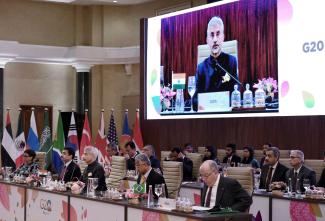Global affairs
How western diplomats should approach India

Prime Minister Narendra Modi’s Bharatiya Janata Party (BJP) is inspired by the right-wing vision of a Hindu Nation. This ideology results in an aggressive agenda against minorities, particularly Muslims, but often Christians too. Since Modi became prime minister in 2014, India has witnessed more lynchings and riots, with perpetrators typically enjoying impunity and often getting praise.
For several reasons, India is nonetheless an indispensable partner for western countries:
- Its population of 1.4 billion is huge, and with a middle-class share of about one third, the country also constitutes a giant market.
- Western countries need immigrants – and members of India’s well educated middle class are prime candidates for filling their labour-market gaps. Moreover, migrants’ contributions to social-protection systems help to stabilise those systems.
- Global challenges such as the climate crisis or disease control require global solutions – which are not feasible without Indian contributions.
- India still has a democratic constitution and an independent judiciary.
- The country is seen as a potential counterweight to China, which is increasingly taking an adversarial and even hostile stance to the USA and its allies.
Disengagement from India is thus not an option. Moreover, it would be impossible to isolate the country. India’s relations with foreign governments are shaped by mutual needs and specific demands, so western calls to back off from India would, in many cases, fall on deaf ears.
Western credibility is at stake
For the sake of their own credibility, however, western governments must not shy away from publicly discussing worrisome trends. The human-rights situation, which was never good, is worsening. India’s minorities are being marginalized, and the freedom of expression is under attack.
The most recent set-back for the freedom of the press was Modi’s campaign against a BBC documentary. It closely scrutinised the anti-Muslim riots that left some 1000 people dead in Gujarat in 2002, when Modi was that state’s chief minister. According to the BJP, the sober documentary was anti-Indian propaganda marked by a colonial mindset. State agencies prevented screenings in public universities.
Even the British government failed to stand by the BBC in this crisis. When western diplomats fail to insist on human-rights principles when dealing with India, however, their rhetoric rings hollow. At the very least, they must defend media productions that meet professional standards of accurate reporting, factual truth and respect for all sides of a controversy.
In bilateral and multilateral settings, western diplomats should keep issues of human rights and democratic principles on the agenda. To do so convincingly, they must improve their own performance regarding those universal standards themselves. How the EU and USA are treating desperate migrants in search of a refuge is denting their moral authority.
Engaging diaspora communities
What happens inside a country, moreover, has an impact on its foreign relations. That is particularly true as diaspora communities experience western values in daily practice. If immigrants feel accepted, well treated and even actively included in public life, they will tell their communities back home. And if they feel unwelcome, exploited and intentionally excluded, they’ll spread that information.
Modi is keen on approval by western governments as well as non-resident Indians. He wants to be perceived as a democrat. Diplomats should tie their appreciation to all relevant criteria. To make diaspora communities their partners, western nations must treat them well, and that will serve better business relations too. Mutual respect does not result only from the interaction of top policymakers.
In all relevant areas, western governments must apply universal standards rather than merely their own. S. Jaishankar, India’s minister of external affairs, has said: “Europe has to grow out of the mindset that its problems are the world’s problems, but the world’s problems are not Europe’s problems.” His sentence resonates with many people around the world. He spelled out quite nicely what kind of diplomacy does not work.
Suparna Banerjee is a Frankfurt-based political scientist.
mail.suparnabanerjee@gmail.com








